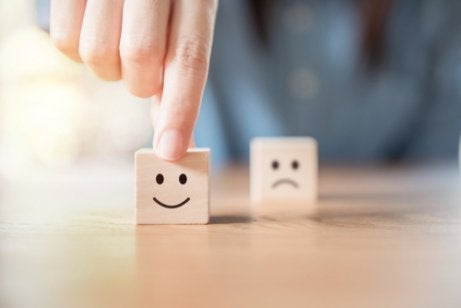The Problem with Social Comparisons


Written and verified by the psychologist Valeria Sabater
Most of us have a very bad habit that we might not be aware of. It often begins at a very young age, with your parents comparing you to others, highlighting what they have and what you lack. Adults do it too, sometimes with very good intentions. Has anyone ever pointed out your shortcomings in comparison to others? Today, we’re going to talk about the causes of and problems with social comparisons.
Daring to be different is challenging in a society that tends to value conformity. You may not even be looking to rebel but it’s enough to step outside the boundaries of what’s “socially acceptable” for people to start pointing fingers.
No one is like anyone else. No one is better or worse, and, as the saying goes, comparisons are odious. Nevertheless, making comparisons between people is common human behavior. It’s almost a vice, a contagious obsession that inhibits personal growth and eats away at your identity.
After all, people don’t usually make comparisons if they’re trying to praise you for being unique and special. Instead, they’re drawing attention to the fact that you’re lacking in some way, that you fall outside the norm.
Comparison is like poison for your self-esteem. It’s bad if you’re doing it to yourself; if you have the bad habit of looking outward to find your self-worth. It’s equally damaging when others distort your self-image, potential, or character when they compare you to others.
“Uniformity is death, diversity is life.”
-Mijail A. Bakunin-

Why people compare
Leon Festinger proposed a theory of social comparison in 1954 that emphasized an interesting point. If an individual doesn’t have a clear idea about their value, effectiveness, or traits, they usually focus their attention on those around them. That gives them a reference point to use for evaluating themselves. In short, people try to define who they are in comparison to others.
You probably know that this habit is a source of constant frustration. So why do we do it? Here’s an example. Think about a mother who’s constantly comparing her two daughters. She reminds the youngest almost every day that, when her sister was her age, she already had a job, a stable relationship, and a child.
If that weren’t bad enough, the younger daughter has to put up with constant scrutiny from her significant other as well. He tells her that she’s as insecure as one of his coworkers and that she lacks motivation. These kinds of comments have a significant impact on the young woman’s self-image. How could they not? They create insecurities and chip away at her self-esteem.
When you get a complex about something, Confucius said it starts out like a guest in your home but it eventually takes over completely. If other people are also reinforcing and feeding these ideas every day, it can have pretty serious consequences. Considering how damaging this behavior can be, you might be wondering what causes it. Let’s take a look.

A lack of emotional intelligence
People who do a lot of social comparisons tend to lack emotional intelligence. If you keep this in mind, maybe you’ll be less likely to engage in this type of behavior. Those who make these comparisons lack the empathy to understand that each individual person has their own personality, essence, presence, and values.
If you can’t comprehend that, you’ll have a hard time connecting with others. You won’t respect them and you won’t be able to put yourself in their shoes. Another principle of emotional intelligence is appropriate communication. That approach argues that the use of comparisons isn’t useful or valid.
If you’re trying to talk to someone about their behavior, it’s better to talk specifically about what they’re doing without referring to anyone else.
- For example, you shouldn’t say to a child “You’re as bad at math as your brother Pablo. You’re hopeless!” The emotionally intelligent approach would be to say, “I see you’re having some problems in math, but I think if you try a little harder and ask for help, you’ll be fine.”
People who don’t value what they have
People who do a lot of social comparisons might not appreciate what they have. Parents who believe that everyone else’s children try harder or a spouse that doesn’t realize everything their partner does for them, etc. You do it to yourself, as well. When you compare your traits to other people’s you aren’t valuing yourself as you should.
A study published in the Journal of Personality and Social Psychology by Dr. Sebastian Deri and Dr. Shai Davidai found that those who compare themselves and their loved ones to other people don’t appreciate who they are nor what they have. Their pessimism and discontent also prevent them from appreciating their loved ones for who they are.
You can imagine why this is highly problematic.

Emotional manipulation
Last but not least, there’s a third and ultimately nefarious potential motive behind social comparisons, which is manipulating others and damaging their self-esteem. This is actually a common tactic among those who want to be in control because the constant comparisons are humiliating and degrading.
In conclusion, you can see that, while social comparisons are common, they certainly aren’t healthy. People who do it a lot tend to lack respect and empathy, the building blocks of social connection. If you find yourself the victim of this kind of manipulation, try to avoid playing into it. Stand up for yourself and defend your individuality. There’s only one you, and that makes you worthy.
“We are sun and moon, dear friend; we are sea and land. It is not our purpose to become each other; it is to recognize each other, to learn to see the other and honor him for what he is: each the other’s opposite and complement.”
-Hermann Hesse-
All cited sources were thoroughly reviewed by our team to ensure their quality, reliability, currency, and validity. The bibliography of this article was considered reliable and of academic or scientific accuracy.
- Deri, S., Davidai, S., & Gilovich, T. (2017). Home alone: Why people believe others’ social lives are richer than their own. Journal of Personality and Social Psychology, 113(6), 858-877. http://dx.doi.org/10.1037/pspa0000105
This text is provided for informational purposes only and does not replace consultation with a professional. If in doubt, consult your specialist.








